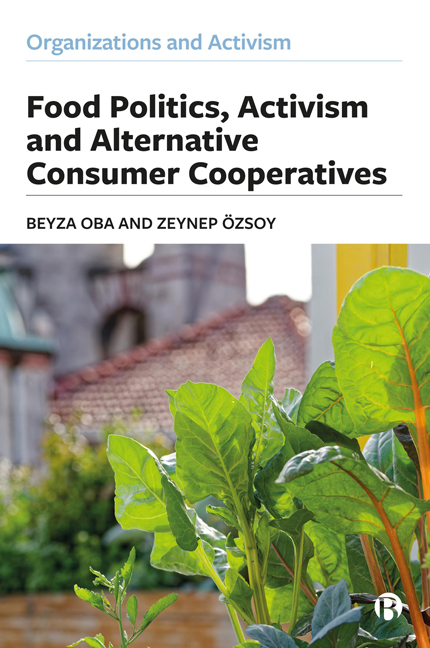Book contents
- Frontmatter
- Contents
- Series Editors’ Preface
- 1 Introduction: Experimenting with Direct Democracy
- 2 The Politics of Food: Alignment for Solidarity and Resistance
- 3 Against Neo-Liberalism and Authoritarianism: The Background to Food Politics in Turkey
- 4 The Political Economy of Consumer Cooperatives in Turkey
- 5 Alternative Consumer Cooperatives in the Making of a Public Sphere
- 6 Experimenting with an Alternative to the Capitalist Food Provisioning System
- 7 The Governance of Alternative Consumer Cooperatives
- 8 Instead of a Conclusion
- Notes
- References
- Index
4 - The Political Economy of Consumer Cooperatives in Turkey
Published online by Cambridge University Press: 27 March 2024
- Frontmatter
- Contents
- Series Editors’ Preface
- 1 Introduction: Experimenting with Direct Democracy
- 2 The Politics of Food: Alignment for Solidarity and Resistance
- 3 Against Neo-Liberalism and Authoritarianism: The Background to Food Politics in Turkey
- 4 The Political Economy of Consumer Cooperatives in Turkey
- 5 Alternative Consumer Cooperatives in the Making of a Public Sphere
- 6 Experimenting with an Alternative to the Capitalist Food Provisioning System
- 7 The Governance of Alternative Consumer Cooperatives
- 8 Instead of a Conclusion
- Notes
- References
- Index
Summary
Introduction
During the last two decades, with the implementation of populist neo-liberal policies, Turkish agriculture has gone through a comprehensive restructuring which has led to economic and social transformations. Petty commodity producers have become distanced from agriculture, the peasantry has declined, and a majority of the young rural population has moved to the cities, and comprise an informal labour force. Those who stayed in the rural areas have became proletariat on their own land with the pervasive implementation of contract farming by the agro-food companies. These transformations on the production side are coupled with the food crises, namely price rises and low-quality foodstuff, in the cities. Alternative consumer cooperatives, (ACCs) with their alternative provisioning system, governance model shaped by direct democracy and a commitment to the premises of the food sovereignty movement, can provide a solution in reconfiguring the prevalent production– consumption nexus. Especially after 2013, as awareness of the social, political and economic effects of capitalism grew, we began to witness the progression of alternative cooperatives in Turkey. In the Turkish context, alternative consumer cooperatives, besides forming a site for the development of an alternative to the capitalist forms of organizing, provide a remarkable example in terms of divergence from the conventional consumer cooperatives (CCCs).
The cooperative movement in Turkey is rooted in the examples that were developed during the decline of the Ottoman Empire. These early examples provide the background to understanding the evolution of the CCCs; they were established by the deliberate efforts of statesmen in an effort to provide a solution to the problems faced by villagers. Secondly, although there were some initiatives for a cooperative model based on the example in Rochdale, their operations were terminated by the ruling party. These grassroots initiatives, shaped by the ideas of the intellectuals Mustafa Suphi, Ethem Nejat and Ahmet Cevat, were expected to by-pass the middlemen and support the consumers to be their own producer. These experiences are important in underlining the dominant role of the state and the tensions between the ruling cadres and the intellectuals, and provide an explanation of how cooperatives are instrumentalized by the state. Similar tendencies shaped the cooperative movement in the early days of the Republic; cooperatives were mainly initiated by a state-owned organization (for example, a bank or factory) with the aim of providing affordable foodstuff to their members and to control price rises.
- Type
- Chapter
- Information
- Publisher: Bristol University PressPrint publication year: 2023

